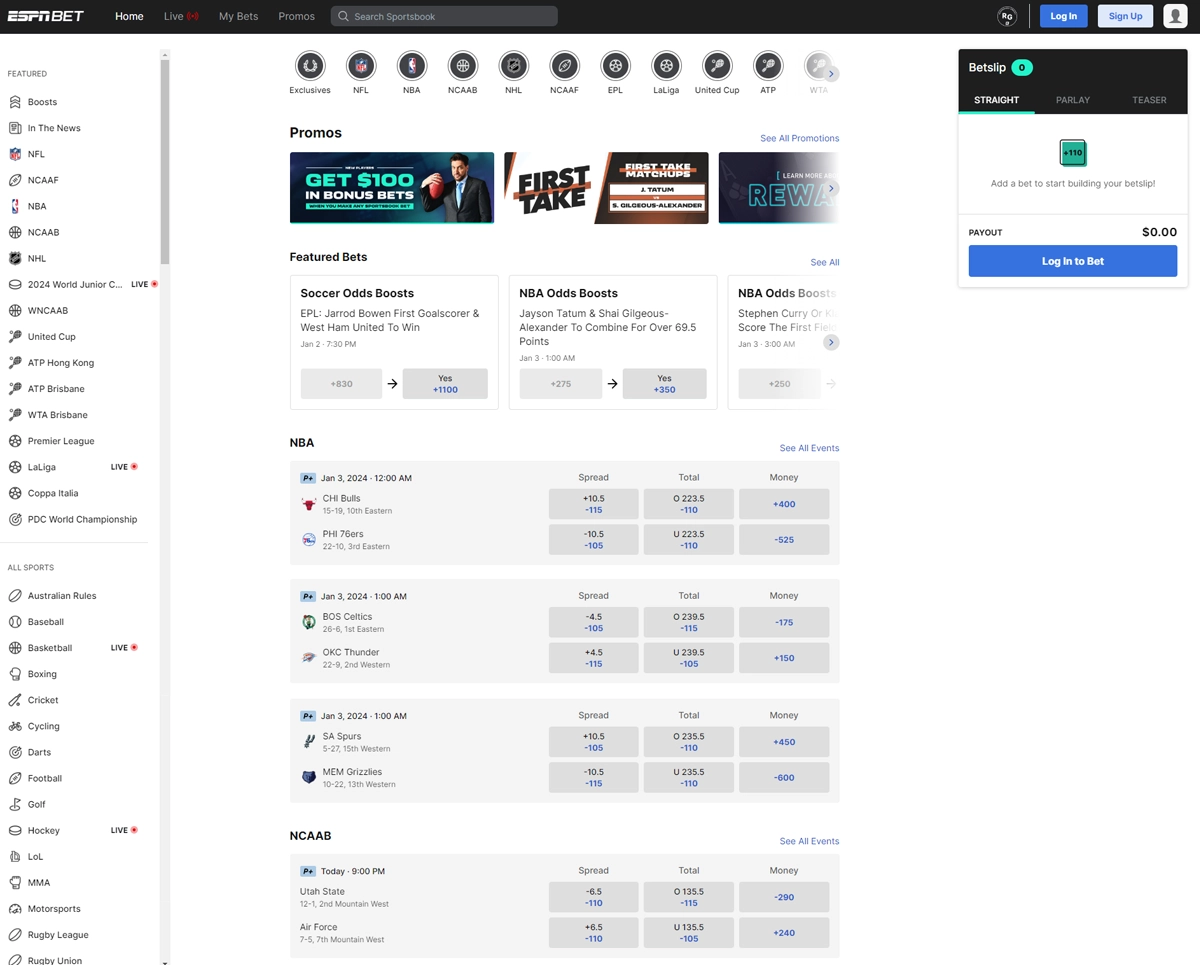Daily Fantasy vs. Traditional Sports Betting: Which Should You Choose?

Sports fans are so lucky when it comes to betting options! There are SO many choices to choose from. When you can put some skin in the game, there are two main ways to go about it. Daily Fantasy or traditional sports betting.
Both are super popular and fun. DFS, as we know it, took off in the early 2010s with platforms like DraftKings and FanDuel turning what used to be season-long fantasy leagues into daily activities.
Traditional sports betting has a way longer history (we are talking literal centuries of people betting on games), but it entered a new era in the U.S. after a 2018 Supreme Court decision opened the floodgates for states to legalize it. Since then? All major sportsbooks (some of which are run by DFS companies) have launched across the country, giving fans another way to bet on sports outcomes.
But which one is right for you? Do you want to craft DFS lineups or put bets on point spreads and moneylines? We can point you in the right direction!
We’ll explain how each format works, their main differences, the pros and cons, and how your “betting personality” will match up with one or the other. You can choose the right format based on your goals, skills, and preferences, and it matters not if you’re a beginner, a casual bettor, or an experienced casino pro who is curious about the world of sports betting!
What Is Daily Fantasy Sports (DFS)?
Daily Fantasy Sports (DFS) is basically a twist on fantasy leagues; it’s where the contests are condensed into a single day or week instead of a whole season. In a typical DFS contest, you act as a virtual team manager: you draft a lineup of real players under a salary cap, with the goal of assembling the best possible team within that budget. It’s kinda like The Avengers but for Daily Fantasy Sports.
Each player has an assigned salary value, so unfortunately, you can’t just grab all of the superstar athletes. You need strategy and research to find the undervalued gems. Once the games begin, your lineup accumulates fantasy points based on your players’ real-life performances (touchdowns, points scored, yards gained, etc.). The better your picks perform on the field or court? The higher your fantasy score rises!
Unlike betting on a team to win or cover a spread, DFS is a contest against other players. Your payout isn’t fixed by odds; it all depends on where you rank in the contest’s standings. If you’re in a big tournament with thousands of entries, only the top tier of players win money (usually the top ~20%), with the biggest prizes for the top few finishers.
Beginners usually start out by entering big multi-entry tournaments (daydreaming of that big jackpot), and the more experienced DFS players will play head-to-head matchups or smaller contests where skillful lineup optimization can give them an advantage.
DFS Platforms

The DFS world is helmed by a few big names. DraftKings and FanDuel are the giants; they pioneered daily contests in sports like the NFL, NBA, MLB, and more, and became famous for their massive prize pools (like the NFL “Milly Maker” tournament that awards $1 million to the winner ). The platforms have contests with entry fees ranging from $0.25 to $1000+, and they cater to casual fans and high rollers.
Another platform gaining traction is Underdog Fantasy, which is known for its best-ball drafts and simple pick’em contests. Underdog has built a place for itself by concentrating on fun formats and provides generous welcome bonuses (they offer to match your first deposit in bonus cash, giving new players extra funds to play with).
No matter the DFS platform, success does hinge on skill, so you’ll need to research players, analyze matchups, and optimize your lineup like a mini-GM. The payoff? The triumph over thousands of other entrants and possibly a big cash prize if your hunches were right!
What Is Traditional Sports Betting?
Traditional sports betting is the classic form of wagering on sports outcomes; basically, putting money on “who will win, and by how much” or on different in-game events. The foundational bets are easy: you can bet on a team to win outright (moneyline), to win or not lose by more than a certain amount (point spread), or on the total points scored (over/under) in a game. Sportsbooks also offer a smorgasbord (such a good word, smorgasbord) of other bet types, like the following:

- Props: Wagering on specific events or stats (e.g., a player’s points, or which team scores first).
- Parlays: Combining multiple picks into one bet for a higher potential payout (at a higher risk, of course).
- Futures: Betting on outcomes down the road (like who will win next year’s championship).
- Live Bets: Betting on games in real-time as they are happening.
When you make a sports bet, you’re betting against the house (a sportsbook or bookmaker), and they set the odds. Those odds determine both the implied probability and how much you stand to win. Like a bet on a big underdog might pay out 5-to-1 if they win, whereas a bet on a favorite might only pay 1-to-2 (you’d win $50 on a $100 bet) because their win is expected. Your potential payout is defined by the odds at the time you place the wager. If your bet hits? You collect your winnings (the original stake plus profit); if not, the house keeps your stake.
Where it’s Legal
This is the biggest factor for traditional betting. Unlike DFS (which found a legal footing as a “skill game”), sports betting in the U.S. was broadly illegal outside Nevada until 2018.
Since then, legalization has been state-by-state. As of 2025, 39 states plus Washington, D.C. have legalized sports betting in some form (and about 32 of those states offer convenient online/mobile betting through regulated apps). This means if you live in, say, New Jersey or Colorado, you can open up a sportsbook app or gambling site on your phone and place bets legally; but in a few holdout states, you are still out of luck or limited to very specific circumstances, like only betting in-person at certain venues. Always check your local laws.
The most popular online sportsbooks include FanDuel Sportsbook, DraftKings Sportsbook, BetMGM, and Caesars. All are well-known, licensed, and trusted brands where millions of Americans place bets.
And they all actively compete for new customers with generous welcome promos; it’s common to see offers like “Bet $5, Get $150” in bonus bets (a current FanDuel promo, BTW) or deposit-match bonuses up to $1000+ on DraftKings. The emphasis in sports betting is on odds and probability; you’ll hear about “+200 odds” or “-3.5 spreads,” and successful betting always comes down to smart bankroll management and luck that’s riding on the unpredictable nature of real games.
Main Differences at a Glance
Want a summary of the main eight differences between DFS and traditional betting? Look at the side-by-side comparison in the table below!
| Aspect | Daily Fantasy Sports (DFS) | Traditional Sports Betting |
|---|---|---|
Format | Contest-based. You draft a lineup of players within a salary cap and compete against other users in contests. Payouts depend on where you rank in the field. | Odds-based. You place wagers on specific outcomes (team to win, cover spread, etc.) against odds set by a bookmaker. Payouts are fixed by those odds (win or lose your bet). |
Skill vs. Luck | Heavy emphasis on skill and research. Success requires deep player knowledge, statistical analysis, and strategic lineup construction. Luck (player injuries or off-days) still plays a role, but top DFS players can gain an edge with skill. It’s often argued that DFS is more skill-based, akin to “stock picking” in sports. | More mix of skill and luck. Skill comes in analyzing matchups, odds value, and managing your bankroll, but even the sharpest bettor can lose on a bad bounce or upset. In the short term, outcomes can feel very luck-driven, so discipline and a long-term strategy are key. |
Time Commitment | Higher time investment. Drafting a competitive DFS lineup requires significant research time, including checking player stats, injury news, and more. Contests often run for a full day or weekend of games, so you might be sweating over your lineup for multiple hours. | Quick resolution. Placing a bet can be done in seconds, and most bets settle once the game ends that day or night. Less prep work per wager (you can simply pick a side), though serious bettors still invest time in pre-game analysis and tracking bets long-term. |
Bet Frequency | Contest-dependent. You enter specific contests, which might be daily or tied to a set of games (e.g., the Sunday NFL slate). Typically, one lineup per contest (or multiple if you multi-enter). You might not play every day unless there’s a contest you like. | Flexible: you decide! You can bet on any game, any day, across sports. There are opportunities to bet literally 365 days a year if you want, from big games to obscure matches. You control how often and how many bets to place on a given day. |
Potential Payouts | Jackpot-style upside. Small entry fees can win huge prizes if you top a big DFS tournament. A $20 entry in a marquee contest could win $ 100,000 or even $1 million. Even head-to-head games yield a better than 1:1 return if you win (minus a small fee). But consistent small wins are tough; it’s feast or famine in many contests. | Steady but limited by odds. A standard bet roughly doubles your money on a win (minus the house cut). Parlays can multiply payouts, but are long shots. You typically won’t turn $10 into $100k in one bet without insanely unlikely parlays. Big payouts require big stakes. In short, sports betting is usually a grind of incremental profits (if you’re good) rather than lottery-like windfalls. |
Legal Status (U.S.) | Generally legal in most states because it’s seen as a game of skill. Over 40 states allow DFS in some form. Only a handful explicitly ban or restrict it – for example, Hawaii and Idaho consider DFS an illegal gambling activity. (Some others, like Washington and Nevada, have limitations; Nevada requires a special license for DFS, and in Louisiana, DFS is only allowed in certain parishes.) Always check if your state has any DFS restrictions; however, the majority of the country is eligible to play. | Legally treated as gambling. Sports betting laws vary by state. Since 2018, dozens of states have legalized it, although not all have done so. As of 2025, around 38-39 states plus DC have some form of legal sports betting. In the rest, betting with a U.S. sportsbook is still illegal (though some people in those areas resort to unregulated offshore books or bookies, which carry other risks). The legal patchwork continues to evolve. |
Player Pool | Community competition. In DFS, you’re competing against other players. A large tournament might have tens or hundreds of thousands of entries, meaning you’re competing against a huge pool of human opponents for the top prizes. In smaller contests (like 10-person leagues or 1-on-1 matches), the field is smaller, but you still need to beat others. This dynamic creates a social, competitive feel – it’s you vs. everyone else, and sometimes a few “sharks” (very skilled players) dominate the waters. | You vs. the house. When you place a bet, you’re effectively competing against the sportsbook’s predictions. You’re not directly competing with other bettors (except in the sense that lines can move based on collective betting). Each bet is an individual contract: if you win, the book pays you; if you lose, you pay them. There’s no leaderboard or community aspect, though some bettors do enjoy sharing their picks or sweating games together; ultimately, your bets are independent of others. |
House Edge | Rake on entries (~10%). DFS operators take a cut from contest entry fees (often around 10% of the pool) as their revenue. This is the “house edge” in DFS. Additionally, the competitive nature means that a small number of elite players often win a large share of prizes – a 2015 study found that the top 1.3% of players won 91% of DFS profits. In practical terms, the average casual DFS player is up against both the rake and highly skilled opponents, making it challenging to consistently profit. | Vig on bets (~5%). Sportsbooks build in an edge via the odds, commonly known as the vig or juice. For a typical point spread bet, you might risk $110 to win $100 – that extra $10 is the book’s commission if you lose. If you win half your bets over time, you’re roughly paying a 5% fee on each wager to the house. This is a slimmer margin than the DFS rake. However, the sportsbook also has the advantage of setting lines carefully; beating the book long-term is notoriously tough (their odds-makers are very sharp). |
Pros & Cons of Daily Fantasy Sports
There are great things about DFS and some not-so-hot aspects. Keep reading to find out both!
Pros of DFS
- Huge Payout Potential from Small Stakes: Daily Fantasy offers a lotto-like upside. With only a small entry fee, you can possibly win life-changing money if you take down a major contest. We’ve seen tournaments where a $5 or $20 entry turned into six- or seven-figure prizes for the winner. Even smaller contests can offer some really nice returns on your entry if you finish near the top.
- Skill-Based Competition: Unlike pure gambling, DFS rewards knowledge and strategy. Your success is largely determined by how well you analyze players and matchups. A good manager who does their homework can outsmart the field. DFS is legally classified in most places as a game of skill, kind of similar to how investing is seen, because informed decisions can yield better outcomes. For sports fans who pride themselves on knowing obscure stats (“I knew that backup running back was a sleeper!”), DFS is a chance to profit from that expertise.
- Fun, Social, and Engaging: There’s a really strong community aspect. Playing DFS can feel like being part of a big tournament every day; you get real-time leaderboards to track, bragging rights if you beat out thousands of others, and some friendly trash talk in leagues with friends. It adds more excitement to watching games: you’re not only rooting for a team, but for all the individual players on your fantasy roster. The rush of adrenaline when your sleeper pick scores a surprise touchdown? That’s hard to beat.
- Use of Deep Sports Knowledge: If you’re a stats geek or a fantasy football guru, DFS is a playground for you. It rewards people who dig deep into the data. It could be researching a player’s matchup, weather conditions, or listening to injury reports and podcasts for insight. That extensive player and game knowledge you’ve built up as a fan finally has a use! And when your detailed research pays off, it’s incredibly satisfying (not to mention profitable).
Cons of DFS
- Complex Scoring & Gameplay: DFS isn’t as easy as just picking a team to win. Each sport has its own intricate scoring system (points for yards gained, rebounds, birdies, etc.), and roster requirements to understand. There’s a learning curve for newcomers to grasp how lineups are constructed and how different scoring rules affect player value. It can feel a bit like learning a new strategy game, and that can be intimidating.
- “Shark-Infested” Waters: The DFS arena is super competitive, and it has a small percentage of ultra-skilled, high-volume players (aka “sharks”) winning the majority of the money. A study found 85% of DFS players ended up net losers, and only a tiny segment took almost all of the profits. In the big public contests, the experienced players will enter hundreds of lineups optimized by algorithms and data models, and that makes it impossible for a casual player with one or two entries to crack the top. And some contests allow multiple entries per person, and those who have bigger bankrolls can exploit them. This isn’t to say you can’t win as a newbie; you can, especially in beginner contests or smaller leagues, but the playing field definitely isn’t level. A new DFS player could get discouraged after losing to seemingly unbeatable opponents in big tournaments.
- Limited Variety and Market Access: While most major sports are well-represented (football, basketball, baseball, etc.), DFS doesn’t have the breadth of niche sports or events that sportsbooks do. You won’t find daily fantasy contests for, say, curling or badminton. Also, the DFS market is dominated by a couple of platforms (DraftKings and FanDuel primarily), so your options of where to play are somewhat limited. If only one DFS operator is licensed in your state, you’re stuck with that choice. Traditional sports bettors have multiple sportsbook apps to shop lines on.
- Not Legal Everywhere: Although DFS is legal in most places, a few states still ban or restrict it, as noted. If you live in one of those, you can’t participate for real money. And if state laws change negatively, major DFS sites have in the past pulled out until things change. This isn’t a con for most people, but it’s worth mentioning that DFS’s legality isn’t 100% universal or guaranteed in the long run.
Pros & Cons of Traditional Sports Betting
There are also some pros and cons to traditional sports betting as well!
Pros of Sports Betting
- Big Range of Sports & Markets: If it’s a sport, you can bet on it. Major sportsbooks have odds on everything from the popular leagues (NFL, NBA, MLB, college sports) to obscure international sports, and even non-sporting events. You have way more options to tailor your action. Want to bet on European soccer, a UFC fight, or an eSports match? There’s a market for it. DFS, by contrast, is limited to the contests that are offered, and those revolve around the biggest sports in season. Sports betting also lets you explore different bet types (spreads, totals, props, parlays, live bets), which makes it more interesting in terms of variety.
- Straightforward Betting Options: Betting can be as simple as picking a winner. For a newcomer, it’s not hard to understand a basic bet like “Team A to win” or “Team A +4 points” without dealing with fantasy budgets or scoring rules. The binary nature of many bets (win/lose) is conceptually simpler than DFS, where you’re managing a whole roster’s performance. The simplicity appeals to fans who just want to put a quick stake on a game and get an instantaneous result.
- Instant Gratification & Live Betting: Sports bets resolve relatively quickly; after the game or event, you know if you won or lost. A short turnaround is gratifying for those who want quick action. Moreover, live betting (wagering during the game) is an exciting feature of traditional betting that DFS doesn’t have. You can respond to the flow of a game with new bets (like betting on the next team to score, or adjusting your position at halftime). Live betting keeps you engaged throughout the action and gives extra chances to profit (or hedge your prior bets) on the fly, adding a dynamic, interactive element to watching sports.
- More Control and Predictability: With traditional betting, you control your risk and strategy directly. You decide exactly how much to wager on each bet and can scale your bet sizes to your confidence level. If you’re risk-averse, you can stick to modest bets on favorites; if you’re feeling a little bold, maybe a small parlay for a long shot. You’re not locked into a contest structure; you can always skip betting games you don’t feel good about. And disciplined bettors can aim for steady, predictable returns. Some people focus on one sport they know well and make a profit by betting the same unit size consistently. Over time, if you can win more than ~52.4% of your spread bets (the break-even point with standard vig), you can make money. This kind of methodical, data-driven approach might be really appealing if you want an investing-like experience, as opposed to DFS’s big ups and downs.
Cons of Sports Betting
- Tight Margins & Tough to Beat: Sportsbooks have the odds stacked (literally) in their favor. The combination of the bookmaker’s expertise and the built-in house commission (vig) means that winning long-term is challenging. Odds-makers are really skilled at setting lines that accurately reflect the probabilities, so finding “value” bets requires a lot of work (and even then, the edge might be razor-thin). A lot of bettors end up losing in the long run, and it’s often cited that only a small percentage of bettors are truly profitable over time. The expected value of a random sports bet is negative due to the vig, unless you’re better at predicting outcomes than the market.
- Risk of Quick Losses (Bankroll Volatility): Without careful bankroll management, it’s easy to lose money quickly in sports betting. Because you can bet on so many things at any time, people can fall into the trap of over-betting or “chasing” losses by making bigger bets to try to catch up, and that usually spirals out of control. Even if you have discipline, short-term luck can be brutal: you might have several “bad beat” losses in a row due to surprise endings, and that can wipe out your bankroll if you’re not careful. Every dollar placed is at risk; sports betting requires emotional control to ride out losing streaks and avoid going bust, which not everyone finds easy or fun.
- Short-Term Luck and Variance: In a single game or even a series of bets, luck is everything. A referee’s bad call, a last-second Hail Mary touchdown, a star player getting injured in the first minute; any of these unpredictable events can turn a winning bet into a losing one. Unlike DFS, where a large lineup can weather one player’s dud if others perform, a single bet is a pass/fail proposition. The high variance means that even if you make “good bets” (aka bets with solid reasoning), you can still lose due to randomness.
- Potentially Addictive Simplicity: Because bets are so quick and easy to make, you can fall into the habit of making too many bets. All outcomes are resolved quickly, and that can tempt you to roll your winnings into the next game or to try to immediately win back a loss on the next match. The rapid cycle is a dangerous one, and while this is a user behavior caveat (and DFS certainly can be addictive too), the always-available nature of sports betting markets can be a con if you struggle with self-control. Setting limits and sticking to a plan is the most important thing!
Which Is Better for You According to Your Betting Personality?
Every bettor is different. Some of us just love to pore over spreadsheets and injury reports; others only want a quick adrenaline rush on a Sunday afternoon or a Monday night. Below are the most common “betting personality” types and which format could match their style!
If you’re only looking to have some fun on game day without a lot of effort, think about what you like more. DFS can be a blast for casual sports fans who like the idea of “managing a team.” You get a roster of players to follow, which can make a dull game exciting if your fantasy QB is playing. It’s definitely more involved, but the entertainment value is high during the contest. If you like something straightforward, traditional betting might suit you: you can put $10 on your favorite team or the over/under and then kick back and relax. For quick action with minimal prep, a simple sports bet is the ticket.
Verdict: DFS is for a more immersive, all-day fun experience; sports betting is for quick, no-fuss excitement.
Do you love strategy, numbers, and outsmarting others with your knowledge? DFS rewards that mindset. You can spend hours tinkering with lineups, analyzing matchups, and leveraging game theory (like creating a contrarian lineup to beat the field). The more you research the stats and player projections, the better your advantage in DFS lineups. It’s not a coincidence that most DFS pros have backgrounds in analytics or poker; they relish in the strategic depth. Sports betting also involves research (studying odds, matchups, line movements, etc.), but the opportunities to apply creativity are arguably fewer; the odds already factor in a lot of info, so any advantages are more subtle. If you like the process of analysis as much as the outcome, DFS will feel more rewarding day-to-day.
Verdict: DFS for the deep-dive strategist (lots of outlets for your inner stat nerd); sports betting for those who enjoy analysis but prefer to focus on finding the best bets rather than managing an entire fantasy roster.
If you hate volatility and want a better chance of at least something back on your money, you might lean toward straight sports bets. A single bet on a favored outcome (say a heavy favorite moneyline, or taking points with a strong team) might win around 60-70% of the time. Not that any bet is 100% safe, but you can make low-risk wagers if that’s more your style. Plus, you can stake very small amounts if you just want a mild sweat. DFS, particularly big tournaments (GPPs), is inherently high-variance: you either place high and win big, or you win nothing at all. If you play 10 DFS lineups, it’s quite possible none of them make the payout cutoff, leaving you with zero, whereas 10 carefully chosen bets might reasonably expect a few wins. That being said, if you are risk-averse but still want to try DFS, you could stick to 50/50 contests or head-to-heads where you just need to beat one opponent or finish in the top half to win something; those have a flatter risk profile. But overall, the predictability of outcomes is a tad higher in sports betting (even though surprises happen there, too).
Verdict: Traditional betting with conservative bets for the risk-averse (and remember to manage your bankroll cautiously!). DFS only in low-variance contest formats if you insist, but expect big highs and lows.
Got a big bankroll and not afraid to use it? Sports betting has more freedom to bet large sums. In DFS, no matter how rich you are, you’re capped by contest limits; you can’t throw down $50,000 on one DFS lineup in a $10 entry tournament (you’d have to spread it over lots of entries or find a rare high-stakes contest). High rollers will find that even the biggest DFS contests feel limiting. Sportsbooks will accept very big bets (though some limit extremely high stakes, many Vegas books or major apps will take six-figure bets on big games, etc.). If you want the thrill of a big gamble, placing a hefty wager on a game will give you that rush and a chance at a correspondingly big payout. Just remember our earlier point: sportsbooks may have limits, and consistent big winners sometimes do get limited, but purely from a format standpoint, traditional betting is the arena for large wagers.
Verdict: Sports betting for the high-roller; it accommodates big bets directly. DFS can be fun too, but you’ll probably be playing a lot of entries and still might not be able to wager the amounts that move the needle for you.
Some bettors live for competition and measuring themselves directly against others. If that’s you, DFS scratches that itch. When you win a DFS contest, you know it’s because you outsmarted and out-picked other players. It’s a contest of skill among participants, and you can say, “I beat 5,000 other people in that tournament!” That’s why DFS has leaderboards and live finals for major contests; it transforms sports wagering into a competitive sport all its own. For someone who gets a kick out of rising through the ranks and being the best, DFS has a tournament-like experience. Traditional betting is more of a solitary pursuit; even if you win big, it’s you vs. the house, and there’s no public ranking that comes with that (unless you count the occasional sportsbook contest or just telling your friends). Some bettors do form communities to discuss picks, but it’s not the same as directly facing opponents.
Verdict: DFS for the competition-loving fan who wants the feeling of superiority over their peers. Sports betting is more for personal satisfaction and profit, not so much for public glory.
Of course, these personalities aren’t mutually exclusive! You could see a little of yourself in each category. Ultimately, knowing what you enjoy and what your goals are (just entertainment vs. serious profit-seeking, etc.) will be your guiding light!
Can You Do Both? Hybrid Betting Strategies
Of course, you can do both! And a lot of sports lovers dabble in both DFS and traditional betting, as the two can complement each other. Since legal sports betting has seen a lot of crossover, it’s not weird to place a few bets on Sunday’s games while also entering a DFS lineup for that weekend. Below are some practical hybrid betting strategies!
Leverage Synergies in Research
The homework you do will do double duty. Say that you study the upcoming NFL games and determine that the Philadelphia Eagles are likely to have a big passing day due to a mismatch against the opponent’s secondary. You could bet on the Eagles to cover the spread and also stack your DFS lineup with Philly’s quarterback and receivers. If your read is correct? You win your bet, and your DFS lineup excels.
Just be mindful: it can also double your risk if you’re wrong, since both your bet and lineup will suffer from the same misread. Balance is important.
Spread Out Your Engagement
Some people like to use DFS in certain sports and betting in others, or DFS for certain days and betting for others, to avoid getting overloaded. You can focus on DFS during the week (like NBA daily fantasy contests on weeknights), but on the weekend, you make traditional bets on NFL and college football. Or vice versa. Alternating can keep things from getting stale and manage your time commitment.
DFS requires more pre-planning (drafting lineups before contests lock), whereas bets can be placed last-minute. You could, say, do a Thursday night DFS lineup for the NFL game, but on Sunday, when multiple games happen, you stick to betting because it’s too hectic to follow a bunch of fantasy lineups. Find a schedule that lets you enjoy both without feeling overwhelmed!
Bankroll Segmentation
If you do decide to do both, you should keep separate bankrolls or budgets. Allocate a certain amount of money for DFS and a certain amount for sports bets. This way, you can track your profitability in each domain and also make sure that one isn’t unintentionally bleeding into the other. It’s quite possible you’ll be better at one than the other, and tracking your results separately lets you see that! Maybe you see that your DFS plays are hitting positive ROI, but you’re losing on bets. Then you can adjust where you concentrate your money.

It’s also psychologically easier to stomach ups and downs if you’ve siloed the funds: a bad week betting won’t wipe out your DFS and your traditional sports betting stakes if you manage them distinctly.
Diversify Your Action
Using both formats can diversify your risk! They are different games, and there will be times your DFS lineups tank but your sports bets win. Engaging in both means that you’re not putting all your eggs in one basket. Some sharp bettors will hedge: they will bet the under in a game but pick players from that game in DFS in case it turns into a surprise shootout, and either the bet wins (low-scoring game) or the DFS lineup does well (high-scoring game). This kind of a hedge is a little tricky, but it shows that DFS and betting don’t always have to align; they can cover different outcomes.
Time and Attention
Be realistic about the bandwidth you have. Managing a slew of DFS lineups and a bunch of bets simultaneously can be super stressful. If you find it overwhelming, scale it back. Maybe focus on one format per sport or per day. Remember, this is supposed to be fun! Some days, you might not have time to do DFS research, and on those days, a quick bet is fine. Other days, you might skip betting and just play a fantasy contest with friends for fun. There’s no rule that you have to do both (or either) every day.
Conclusion: Choose Your Gameplan
DFS and traditional sports betting are both really fun and exciting ways to engage with the sports you love, but they cater to different tastes and goals. You just have to find which one is up your sports alley!
Below is a quick recap of what you should consider when deciding on your next move:
- Daily Fantasy = more strategy, more variance, more upside: It’s like a skill-based competition with a lottery ticket element. You’ll spend time crafting lineups and doing research. The ride can be volatile (most days you will win nothing), but when you win, you could win big. It’s great for bettors who love strategy, community competition, and the idea of turning a few bucks into a windfall.
- Traditional Betting = more control, faster outcomes, simpler structure: It’s the classic “put your money where your mouth is” on game results. Easier to get into for a beginner (one game, one bet), and you know pretty quickly if you won. You have full control over your wager size and can adopt a steady, systematic approach. Good for those who want consistency, clear odds, and a bit more predictability (relatively speaking!).
- Choose based on your goals and personality: If your main goal is fun and entertainment, think about what sounds more enjoyable: managing a fantasy roster or just sweating a bet on a game? If you’re aiming for profit, ask yourself where your strengths lie; is it analyzing players or odds? If you want competition and bragging rights, DFS will scratch that itch. If you want simplicity and instant gratification, traditional is the way.
- Combine both for a well-rounded experience: There’s no rule that you have to pick one. You can blend the two! Just make sure that you stay disciplined with your bankroll for each and take the time to learn the nuances of both games. A lot of sports fans play a DFS lineup or two and place a couple of bets, and it’s all part of the modern sports experience.
Ultimately, whether you’re setting a fantasy lineup or laying down a wager, the main thing is this: have fun and gamble responsibly! Both DFS and traditional betting can level up the excitement of sports. Give them a go and see which one suits you better (you might surprise yourself), and bask in all of the action.

Alyssa contributes sportsbook/online casino reviews, but she also stays on top of any industry news, precisely that of the sports betting market. She’s been an avid sports bettor for many years and has experienced success in growing her bankroll by striking when the iron was hot. In particular, she loves betting on football and basketball at the professional and college levels.








